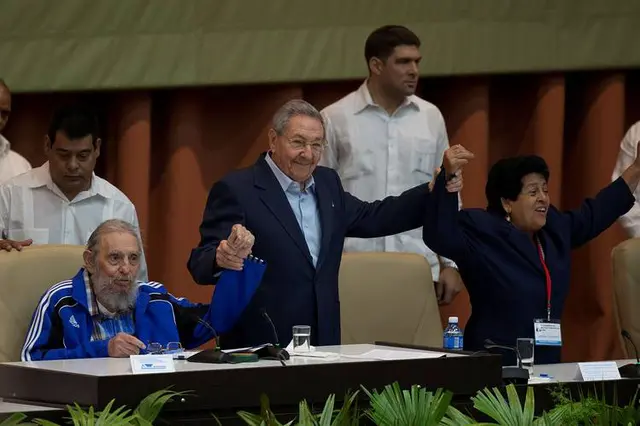The 7th Congress of the Cuban Communist Party (PCC) closed on Tuesday, setting the country on a path of profound economic and social reforms by 2021 amid a leadership transition.
Raul Castro, reelected as the PCC's first secretary, said the Congress would be the last headed by the current leadership, signaling that they would step aside for the younger generation to take over.
"This Seventh PCC Congress will be the last led by the historic generation," Castro said at the closing ceremony of the four-day party congress, where delegates gave his brother, revolutionary leader and former President Fidel Castro a standing ovation.
The Congress was about not only the leadership succession but also the deep economic and social reforms the government is set to implement in the next five years to update the socialist system.
Rafael Hernandez, Cuban political analyst and head of the Temas magazine, said the task is among the hardest challenges facing Cuba in the last 20 years.
"We are not rushing towards a free market economy, nor is our government taking us there. This is a gradual process of transformation, economic diversification and development of a nationalist private sector," Hernandez told Xinhua.
The researcher said Havana must reduce its dependence on imports and develop a greater capacity to produce goods.
"The Cuban people have very high expectations and demands from this reform era because their hope is to restore the quality of life in the 1980s just before the Soviet collapse," he said.
Raul Castro, 84, expects to serve as first secretary of the PCC for another five years. His five-year presidency ends in 2018.
Hernandez said the next several years will be essential for Cuba to speed up reforms initiated in 2011.
The 1,000 or so delegates at the PCC Congress this year agreed to maintain, modify or integrate 87.5 percent of the economic and social guidelines adopted in 2011, and added 50 new ones, preparing a total of 274 guidelines for the economic and social reforms by 2021.
The PCC delegates approved 313 economic and social guidelines at the last party congress in 2011 to begin reforms. It is estimated 21 percent of them have been implemented.
The PCC Congress has decided to back steps to have more foreign investment and a growing private sector of small businesses, while Castro made it clear that such changes would not be rushed.
Observers said the experience of the past five years has shown that it is not easy to produce changes but reforms can't be postponed indefinitely.
Raul Castro said reforms must be made with no haste, but time must be taken into consideration, too.
Hernandez said the Cuban leadership is aware of the importance of implementing key reforms such as putting an end to the country's double currency system, increasing productivity, efficiency and salaries in the state sector and providing a legal framework for private businesses.
But at the same time, the PCC leadership wants to avoid any chaotic shake-up within its ranks as economic reforms are implemented and the revolutionary leaders hand over power to the younger generation.
"In the next five years we'll see an articulated, gradual and easy-going generational transition among the top political positions in the country," Hernandez said.
While most of the top posts of the powerful political bureau were unchanged, the PCC brought in five younger faces in a bid to diversify the leadership.
Raul Castro has called for sweeping changes in economic management and wants top leaders to retire at 70, but he said the next five years would be a transition period and such rules would not be fully applied until 2021.
Perhaps the greatest surprise on Tuesday came when Fidel Castro showed up at the closing ceremony and delivered a keynote address to the surprise of the delegates.
Fidel Castro expressed his support for the process of economic and social reforms and said this might be one of the last times for him to speak in public because of his advanced age.
Fidel Castro, who is soon going to celebrate his 90th birthday, said he didn't expect to live so long but it was rather a caprice of luck.
"Soon I will be 90 and my turn will come like everybody else. But the ideas of Cuban communists will live on to prove that if a country works with dignity and fervor we can produce the necessary goods for our nation," he said. Enditem
 简体中文
简体中文





